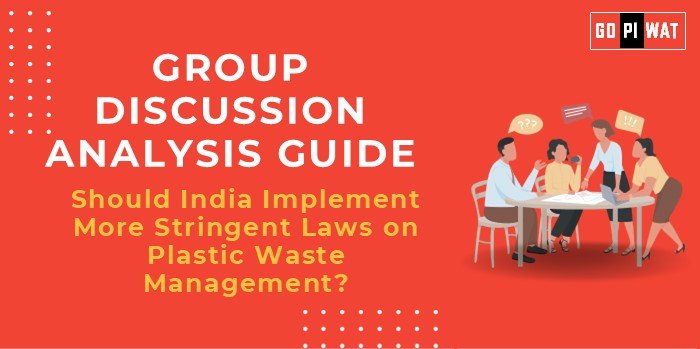📋 Group Discussion (GD) Analysis Guide: Should India Implement More Stringent Laws on Plastic Waste Management?
🌐 Introduction to the Topic
Opening Context
Plastic waste pollution is a significant environmental concern globally. India generates approximately 3.5 million tons of plastic waste annually, and less than 60% is recycled, posing severe ecological and health risks.
Topic Background
India introduced the Plastic Waste Management (PWM) Rules in 2016, amended in 2022, emphasizing extended producer responsibility (EPR) and banning single-use plastics. Despite these efforts, challenges persist due to enforcement issues and systemic gaps.
📊 Quick Facts and Key Statistics
- 🏭 Plastic Waste Generation: India produces 3.5 million tons annually, with per capita consumption growing rapidly.
- ♻️ Recycling Rate: 60%, compared to the global average of 20%.
- 🛑 Single-Use Plastics Ban: Enacted in 2022, yet enforcement remains inconsistent.
- 🌍 Global Comparison: India ranks among the top five global contributors to ocean plastic pollution.
- 💸 Economic Impact: Poor waste management costs India an estimated ₹7,500 crore annually in public health and environmental damages.
🤝 Stakeholders and Their Roles
- 🏛️ Government Agencies: Formulate and enforce PWM laws, fund recycling initiatives.
- 🏢 Corporate Sector: Implement EPR, innovate sustainable packaging.
- 👥 Citizens: Adopt eco-friendly practices, segregate waste.
- 🌍 NGOs & Activists: Drive awareness, advocate for policy reforms.
- 🌏 Global Organizations: Provide funding and expertise for waste management programs.
🏆 Achievements and Challenges
Achievements
- 📜 Policy Initiatives: Introduction of PWM Rules 2016 and amendments.
- 👥 Community Participation: Initiatives like “Swachh Bharat Mission” have raised awareness.
- 🔬 Recycling Innovations: Startups like Banyan Nation use AI to enhance recycling processes.
Challenges
- 🔍 Enforcement Gaps: Weak monitoring mechanisms at the municipal level.
- 🏭 Lack of Infrastructure: Insufficient recycling units, particularly in rural areas.
- 📉 Citizen Compliance: Limited awareness and segregation practices.
- 🌍 Global Comparisons: Japan recycles over 85% of its plastic, highlighting India’s lag.
📂 Structured Arguments for Discussion
- 🟢 Supporting Stance: “Stricter laws on plastic waste will enhance compliance and reduce ecological damage.”
- 🔴 Opposing Stance: “Without infrastructure improvements, stricter laws may overburden citizens and businesses.”
- ⚖️ Balanced Perspective: “Stronger laws, coupled with infrastructure and awareness campaigns, are essential for sustainable plastic waste management.”
📖 Effective Discussion Approaches
Opening Approaches
- 📊 Use a compelling statistic: “India generates over 3.5 million tons of plastic waste annually—equivalent to 9,500 tons daily.”
- 🌍 Discuss global successes: “Countries like Germany recycle 56% of their plastic waste; India can learn from such models.”
Counter-Argument Handling
- ⚠️ Challenge: “Stricter laws alone won’t solve the issue.”
- ✔️ Response: “Complementing laws with capacity-building initiatives can ensure their success.”
🔍 Strategic Analysis of Strengths and Weaknesses
- ✅ Strengths: Established policies, growing recycling startups.
- ❌ Weaknesses: Lack of enforcement, low citizen engagement.
- 🌟 Opportunities: International partnerships, technological innovations.
- ⚠️ Threats: Increased plastic consumption, pollution.
📚 Connecting with B-School Applications
- 💡 Real-World Applications:
- Case studies on supply chain optimization through sustainable practices.
- Strategies for implementing corporate EPR programs.
- 📝 Sample Interview Questions:
- “What policy changes would you recommend to improve plastic waste management in India?”
- “How can the private sector play a role in reducing plastic waste?”
- 📖 Insights for B-School Students:
- Study the intersection of sustainability and business.
- Explore waste management as a viable entrepreneurial opportunity.


